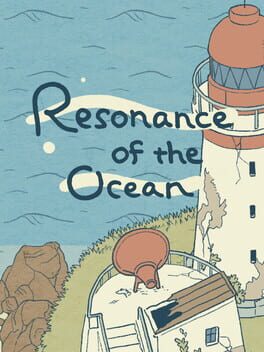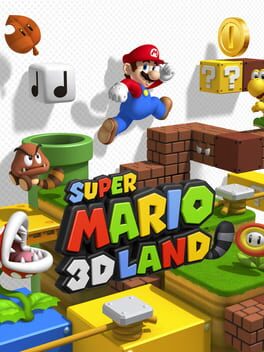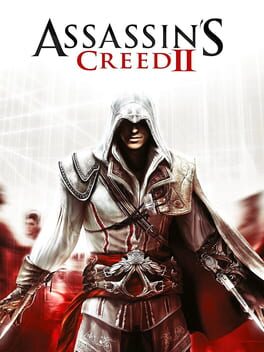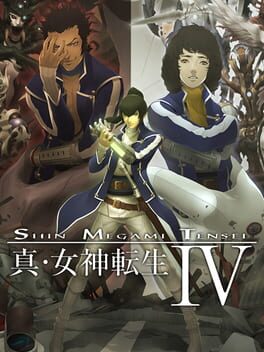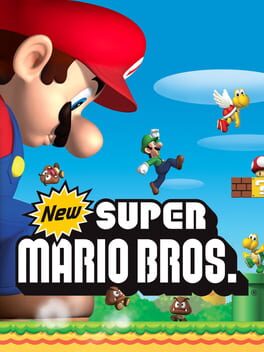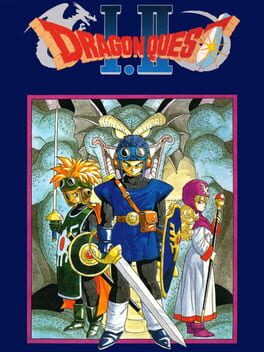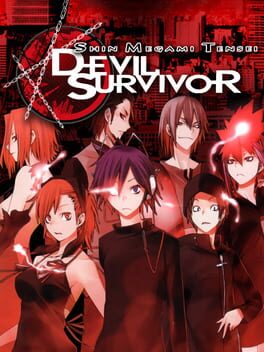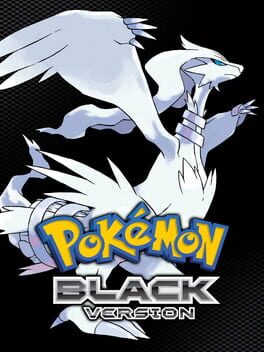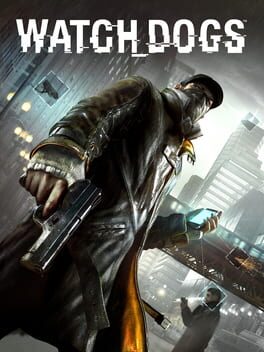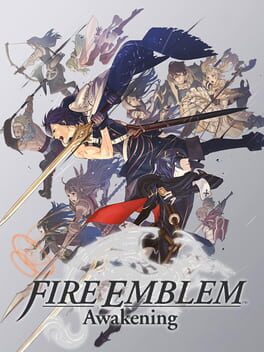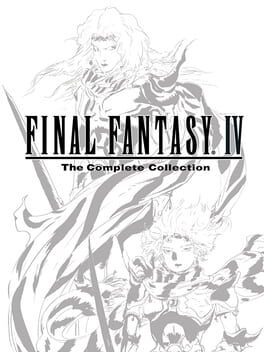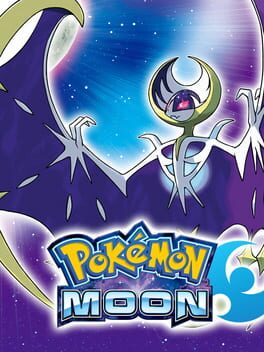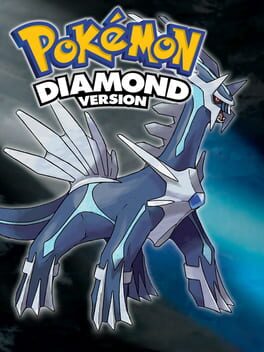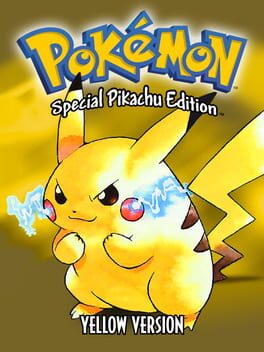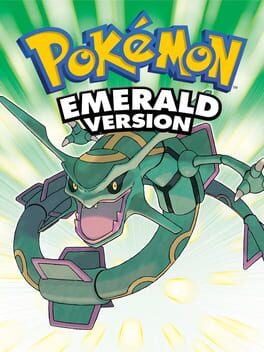2011
If you're used to the 2D platformer mechanic, you'll have to wait to get used to how shadows work in this game, and then you'll be fine onwards.
Gameplay was satisfyingly smooth, and I was breezing through the levels without breaking a single sweat, which I thought of as suspicious– until the game asked me to collect 50 star coins to progress into the boss level. This can come as challenging and fun for some, but if you're like me who has no time for side quests, such as collecting 100 feathers in Assassin's Creed, let alone finding 50 damn coins, then that's easily a deal breaker.
I mean, they could've just make the levels a little bit harder without the need to establish a literal roadblock. I've been really trying to get into Mario games so I'll just forget I ever played this game.
Gameplay was satisfyingly smooth, and I was breezing through the levels without breaking a single sweat, which I thought of as suspicious– until the game asked me to collect 50 star coins to progress into the boss level. This can come as challenging and fun for some, but if you're like me who has no time for side quests, such as collecting 100 feathers in Assassin's Creed, let alone finding 50 damn coins, then that's easily a deal breaker.
I mean, they could've just make the levels a little bit harder without the need to establish a literal roadblock. I've been really trying to get into Mario games so I'll just forget I ever played this game.
2009
Never had I expected that I would be a sucker for Assassin's Creed II. It shames me not that I have fallen captive by this game! Unlike the prequel, this one is fairly easy to digest story-wise, and not only that, the characters were entertaining enough to pull me in. It's weird enough that we witness Ezio's birth, but how he ascends to being an assassin clouded only with vengeance was what grappled me to seeing him develop as a person.
The stealth, maneuver and combat mechanics improved in many ways and I can only imagine how more polished those will be in Brotherhood and Revelations. The architecture of the cities played a huge part, too for it provided rather successfully the Renaissance mood; and the structures made it so smooth to do parkour on. The missions such as the one with the carriage, and also the flying machine (both missions involved Leonardo da Vinci, a comfort character) surely added variety to the campaign.
I have this compulsive knack of completing collectibles (codecs, seals, even paintings and such) early in the game, which proved very rewarding because there's a particular requirement that may keep the player from progressing into the last sequence. Also, how Monteriggioni goes from a gloomy little town to a vibrant and populous headquarters every time you renovate, explore tombs, and collect items is a creative way to make such a video-game chore quite motivating.
Although there were fewer moments of Desmond here than the prequel, the modern-world scenes were sufficient enough to make things make more sense. Ezio's ending however was kind of ambiguous and Minerva gave me the creeps. I also love how the ending credits roll while also letting you play the game still. It seems that Ubisoft knew that no one actually pays any attention to the credits. I wish the person in their company who thought of that idea was given a raise.
I might get ridiculed for actually putting this game on my favorites list, but it would just be a disservice for me not to. I know that there are better stealth games out there but too bad, because this one became a personal core memory.
The stealth, maneuver and combat mechanics improved in many ways and I can only imagine how more polished those will be in Brotherhood and Revelations. The architecture of the cities played a huge part, too for it provided rather successfully the Renaissance mood; and the structures made it so smooth to do parkour on. The missions such as the one with the carriage, and also the flying machine (both missions involved Leonardo da Vinci, a comfort character) surely added variety to the campaign.
I have this compulsive knack of completing collectibles (codecs, seals, even paintings and such) early in the game, which proved very rewarding because there's a particular requirement that may keep the player from progressing into the last sequence. Also, how Monteriggioni goes from a gloomy little town to a vibrant and populous headquarters every time you renovate, explore tombs, and collect items is a creative way to make such a video-game chore quite motivating.
Although there were fewer moments of Desmond here than the prequel, the modern-world scenes were sufficient enough to make things make more sense. Ezio's ending however was kind of ambiguous and Minerva gave me the creeps. I also love how the ending credits roll while also letting you play the game still. It seems that Ubisoft knew that no one actually pays any attention to the credits. I wish the person in their company who thought of that idea was given a raise.
I might get ridiculed for actually putting this game on my favorites list, but it would just be a disservice for me not to. I know that there are better stealth games out there but too bad, because this one became a personal core memory.
I can't possibly stress enough how I've strayed from any genre that includes dungeon-crawling in my history of gaming for the reason that it makes me extremely claustrophobic. I began playing SMT4 in 2020 when I found out that the Persona titles are actually spin-offs and also the fact that the 3DS was accessible to me. I've certainly had a hard time commiting to this playthrough since lurking through the depths of Naraku was definitely not my cup of tea– resulting to an on and off gameplay, but hey! Though it took me a year and a half, it's safe to say that for the first time, I properly have beaten a Megaten main-series title!
Exploring Naraku was a rough start for me in all honesty– leveling up and gathering macca and all that. Also how you have to walk a long way to get to the Barracks and regen your HP and then go cave diving again. At that time, this game wasn't making that much of an appeal to me. But trust me, all of those will pay off when you beat the first main bosses and gain access to terminals and install enough Burroughs apps to make your life easier. Tokyo at first was confusing but the routes was not actually that hard to familiarize with, contrary to the popular notion that it's easy to get lost in this game. Some domains were annoying to explore due to the mapper not functioning, but you can always skip those.
The soundtrack and overall ambience mostly filled me with dread and eeriness that I would avoid playing if the lights in my room aren't on. Maybe it's because I get frightened easily, but I think the interior designs of a post-apocalyptic setting was developed as if those were of a horror game.
The dichotomy of chaos and order were also laid out magnificently throughout the game. Midway, you are given a main choice to choose an alignment path; but would that affect the ending? Not quite yet. Mysteriously enough, you'll get transported to two different versions of Tokyo, giving you a not-so-ample time to justify your choices. I chose the Chaos alignment in the end which was represented by Walter because I couldn't find myself agreeing with Jonathan's philosophies. I watched the other endings as well, and I really think Isabeau's route was the most rewarding.
Overall, I would say this was a mixture of pleasant and unpleasant experience. The grinding was not as painful as I anticipated but the exploration got annoyingly tedious in the end. Regardless, the entirety of this experience seems memorable enough since I had to burst out of my comfort bubble, and it's always satisfying to acquire a fresh perspective on gaming, JRPG's in particular.
Exploring Naraku was a rough start for me in all honesty– leveling up and gathering macca and all that. Also how you have to walk a long way to get to the Barracks and regen your HP and then go cave diving again. At that time, this game wasn't making that much of an appeal to me. But trust me, all of those will pay off when you beat the first main bosses and gain access to terminals and install enough Burroughs apps to make your life easier. Tokyo at first was confusing but the routes was not actually that hard to familiarize with, contrary to the popular notion that it's easy to get lost in this game. Some domains were annoying to explore due to the mapper not functioning, but you can always skip those.
The soundtrack and overall ambience mostly filled me with dread and eeriness that I would avoid playing if the lights in my room aren't on. Maybe it's because I get frightened easily, but I think the interior designs of a post-apocalyptic setting was developed as if those were of a horror game.
The dichotomy of chaos and order were also laid out magnificently throughout the game. Midway, you are given a main choice to choose an alignment path; but would that affect the ending? Not quite yet. Mysteriously enough, you'll get transported to two different versions of Tokyo, giving you a not-so-ample time to justify your choices. I chose the Chaos alignment in the end which was represented by Walter because I couldn't find myself agreeing with Jonathan's philosophies. I watched the other endings as well, and I really think Isabeau's route was the most rewarding.
Overall, I would say this was a mixture of pleasant and unpleasant experience. The grinding was not as painful as I anticipated but the exploration got annoyingly tedious in the end. Regardless, the entirety of this experience seems memorable enough since I had to burst out of my comfort bubble, and it's always satisfying to acquire a fresh perspective on gaming, JRPG's in particular.
1993
I would've love these games to death only if I were born much earlier, was given a Gameboy or Famicom as a christmas present, and be able to play these beside a cozy fireplace on a cold winter day. Although it would also be a terrible experience having no internet to look up guides on as it is easy to get lost in these games.
Dragon Warrior 1 was hella simple, while 2 was pretty much similar– but with additional requisites to gain access to the boss. It's exhilarating to gather Cannock and Moonbrooke for your party at the start, until you have to worry about their individual equipments. Also, the grinding was painful and felt tedious. In hindsight, I guess these would count as a comfortable introduction to the series.
Dragon Warrior 1 was hella simple, while 2 was pretty much similar– but with additional requisites to gain access to the boss. It's exhilarating to gather Cannock and Moonbrooke for your party at the start, until you have to worry about their individual equipments. Also, the grinding was painful and felt tedious. In hindsight, I guess these would count as a comfortable introduction to the series.
Although a spin-off, SMTDeSu could be a proper introduction to the MegaTen series, especially if you're familiar to Fire Emblem's combat system. The overworld aspect and anime art style are also a bit too welcoming for new players. One reason to choose the first version over Overclocked is that the DS/lite handhelds are definitely way cheaper– or easier to emulate if you so desire– than the later handheld; and the first opening is essentially a banger, way more than the 3DS version.
One shouldn't expect DeSu to be smoothly easy though as it can still be as punishing and unforgiving as the mainline titles. It was kind of surprising that such a spin-off in a DS console catered to young audiences deals with graphic themes such as nudism and fairly heavy Biblical allegories– but if you know SMT firsthand then of course there's nothing new about that. What also contributed variety to this title is the freedom to take on numerous endings depending on choices that are spread throughout varied timeframes of the campaign.
The last boss, Babel, was frustratingly brutal. Well, maybe at least for me. The boss phases were to be expected, but it was the foe's ability to spawn demons that made it painful. Demons that can cast heal with other demons! Talk about fighting another player like yourself who can spam potions, except you can run out of mana, while the opponent can keep spawning his obedient subjects and healing themselves.
spoiler section
I actually made my way through the campaign without any foreknowledge of multiple endings, so I unknowingly took Naoya and Kaido's route of the climax. I felt betrayed to see two of my familiar companions go, especially Yuzu because I had been with her since the beginning. It was also a pain in the ass to find new set of passive abilities for Naoya and Kaido.
In the bright side, all my respect goes to Atsuro for being a certified brother and for never leaving me behind even when I decided to reign as a Demonic Overlord and dominate all angels, demons, and humanity alike.
One shouldn't expect DeSu to be smoothly easy though as it can still be as punishing and unforgiving as the mainline titles. It was kind of surprising that such a spin-off in a DS console catered to young audiences deals with graphic themes such as nudism and fairly heavy Biblical allegories– but if you know SMT firsthand then of course there's nothing new about that. What also contributed variety to this title is the freedom to take on numerous endings depending on choices that are spread throughout varied timeframes of the campaign.
The last boss, Babel, was frustratingly brutal. Well, maybe at least for me. The boss phases were to be expected, but it was the foe's ability to spawn demons that made it painful. Demons that can cast heal with other demons! Talk about fighting another player like yourself who can spam potions, except you can run out of mana, while the opponent can keep spawning his obedient subjects and healing themselves.
spoiler section
I actually made my way through the campaign without any foreknowledge of multiple endings, so I unknowingly took Naoya and Kaido's route of the climax. I felt betrayed to see two of my familiar companions go, especially Yuzu because I had been with her since the beginning. It was also a pain in the ass to find new set of passive abilities for Naoya and Kaido.
In the bright side, all my respect goes to Atsuro for being a certified brother and for never leaving me behind even when I decided to reign as a Demonic Overlord and dominate all angels, demons, and humanity alike.
It's such a shame that the Gen 5 titles are being unanimously loved too late when it received such an amount of backlash when it launched, that caused divisive takes among the community. If we compare Pokémon B/W to the recent mainline and remake titles, content-wise, we can see how the franchise devolved into a soulless turn-based game that forces a supposedly dead nostalgia to its audience. Black and White were obviously catered to slightly more mature players so target audience isn't even an excuse at this point.
Before I turn this review into a hate speech, let me just exclaim that B/W is in itself perfect and any form of remakes or remasters in the future will probably have insurmountable standards ahead of them to climb. GF probably realized back then that aside from their fanbase, the formula they've been using was also getting older, so they risked to deliver an unconventional formula of experiencing the Pokémon world as a trainer– and they did deliver it beautifully. Best plot. Best characters. Best philosophy. Best villain group. Best designs– unsure about the mons. Best battle mechanics. Best bridges. Need I say more?
Before I turn this review into a hate speech, let me just exclaim that B/W is in itself perfect and any form of remakes or remasters in the future will probably have insurmountable standards ahead of them to climb. GF probably realized back then that aside from their fanbase, the formula they've been using was also getting older, so they risked to deliver an unconventional formula of experiencing the Pokémon world as a trainer– and they did deliver it beautifully. Best plot. Best characters. Best philosophy. Best villain group. Best designs– unsure about the mons. Best battle mechanics. Best bridges. Need I say more?
2014
This was not even half bad. I liked some of the side missions, especially the tourist hotspots ones. There is serenity in driving around Chicago to unlock hotspots and read about its history– a very nerd thing to do in an open-world video game. Aiden's story was not so engrossing but also not to the point that it bored me out. There were some adrenaline-inducing main missions, and those were enough to keep me playing halfway through the campaign. Yet in the end, there was a hint of realization that this game wasn't at all for me. The puzzles were tasteless and while I think that's just a minor issue, it felt very Ubisoft-like repetitive. I don't know if I may want to continue this game in the future just for the sake of completion, but until then this playthrough will remain unfinished.
I'm gonna be completely honest about the fact that I don't remember many things about this playthrough. I mean, sure, I defeated Grima and cleared the Endgame chapter– and that's pretty much it. I do remember focusing on my two favorite supporting characters: Lon'qu, the swordsman who's always tense and so over the edge; and the peculiar-looking dark mage Tharja who probably represents my general taste for waifus.
Needless to say, FE: Awakening was very immersive in terms of gameplay mechanics. I also loved the anime-themed CGI cutscenes. Considering that I was playing on the launch version of 3DS, it really blew my mind. The way you can interact with the NPC's was absolutely entertaining as well.
Needless to say, FE: Awakening was very immersive in terms of gameplay mechanics. I also loved the anime-themed CGI cutscenes. Considering that I was playing on the launch version of 3DS, it really blew my mind. The way you can interact with the NPC's was absolutely entertaining as well.
First entry in the Final Fantasy series that I played and finished– sequel not included.
I have if not close to none, several recollections of FFIV and the first thing that always comes to mind is the love triangle between Cecil, Rosa and Kain. Second is the genius of Nobuo Uematsu's musical score and how the soundtrack enriches the emotional distinction of each of the characters. Any futile attempt of elaboration to this take would suffice, so just go to Youtube or Spotify and listen to the Theme of Love and Melody of Lute.
As this was my first FF game, the excitement and curiosity of going from point A to point B were priceless and very rewarding. Getting lost between explorations is inevitable though, so I had to resort to online guides. Also, I found it very annoying as to how you have to be meticulously precise on where to land your airship.
The way the turn-based combat flows caught me by surprise because I was used to Pokémon's passive mechanics. It's just the way that the foes attack you if you take too long to decide on what to do next is what adds more spice to the combat.
Overall, I would say that starting with FF4 is a fantastic way to get into the series. I finished FF1, again on the PSP, months after this playthrough and I'm still planning to proceed to the second title.
I have if not close to none, several recollections of FFIV and the first thing that always comes to mind is the love triangle between Cecil, Rosa and Kain. Second is the genius of Nobuo Uematsu's musical score and how the soundtrack enriches the emotional distinction of each of the characters. Any futile attempt of elaboration to this take would suffice, so just go to Youtube or Spotify and listen to the Theme of Love and Melody of Lute.
As this was my first FF game, the excitement and curiosity of going from point A to point B were priceless and very rewarding. Getting lost between explorations is inevitable though, so I had to resort to online guides. Also, I found it very annoying as to how you have to be meticulously precise on where to land your airship.
The way the turn-based combat flows caught me by surprise because I was used to Pokémon's passive mechanics. It's just the way that the foes attack you if you take too long to decide on what to do next is what adds more spice to the combat.
Overall, I would say that starting with FF4 is a fantastic way to get into the series. I finished FF1, again on the PSP, months after this playthrough and I'm still planning to proceed to the second title.
2016
First off, this will be more of an argument rather than a review. Many OG fans are not happy with Sun/Moon and I think I know partly the reason for that: change.
While this game had been bombarded with countless of unskippable cutscenes, I think it's not bad for GameFreak to go over that direction. Popular JRPG's like Final Fantasy link the plot, characters, thematics and worldbuilding by using, yes, cutscenes– and mind you, they have many of that. Fire Emblem: Awakening had few cutscenes throughout the game and I think they executed those very well.
What sets those two franchises apart from Pokémon is that previous Pokémon titles only had cutscenes, particularly in the climax, when two or three Legendary Pokémon fight head on; or if a genocidal maniac decides to end the world all of a sudden. And it's safe to say that fans are used to this "more gameplay, less story" execution. I would agree on the part that cutscenes in the Gen 7 came off as weak and unrefined, but then again I appreciate the past efforts of GF for taking the risk to deliver a new sort of flavor to their well-known franchise.
Another factor here is the all new formula that Gen 7 set on: Island Challenges. It is a given knowledge that collecting badges is the conventional way of progressing in a Pokémon mainline game. Battling Totem Pokémon and Island Kahunas to hop from an island to another is indeed a different mechanic but perspective-wise a brand new experience. Why? Because Alola is developing. This was the first mainline title that didn't have Gyms and I think the reason for that is that the four major islands were separated by waters, each having distinct Guardians, and not so united enough to establish a system that the other regions were fond to. Hence, the Alolan League was built in that very region for the very first time. A region in its very roots!
This is not the first time backlash happened in a Pokémon main title though. Gen 5 sort of flopped just because genwunners despised the Pokémon designs despite having the perfect plot, characters and worldbuilding. I'm probably wrong and that GF is indeed lazy, but maybe this is the reason why Gen 8 became soulless and generally bland.
Overall, I loved having been able to experience playing in a region that is still building its foundations alongside innovating continents while also preserving its diverse identity. Pokémon Moon delivered.
While this game had been bombarded with countless of unskippable cutscenes, I think it's not bad for GameFreak to go over that direction. Popular JRPG's like Final Fantasy link the plot, characters, thematics and worldbuilding by using, yes, cutscenes– and mind you, they have many of that. Fire Emblem: Awakening had few cutscenes throughout the game and I think they executed those very well.
What sets those two franchises apart from Pokémon is that previous Pokémon titles only had cutscenes, particularly in the climax, when two or three Legendary Pokémon fight head on; or if a genocidal maniac decides to end the world all of a sudden. And it's safe to say that fans are used to this "more gameplay, less story" execution. I would agree on the part that cutscenes in the Gen 7 came off as weak and unrefined, but then again I appreciate the past efforts of GF for taking the risk to deliver a new sort of flavor to their well-known franchise.
Another factor here is the all new formula that Gen 7 set on: Island Challenges. It is a given knowledge that collecting badges is the conventional way of progressing in a Pokémon mainline game. Battling Totem Pokémon and Island Kahunas to hop from an island to another is indeed a different mechanic but perspective-wise a brand new experience. Why? Because Alola is developing. This was the first mainline title that didn't have Gyms and I think the reason for that is that the four major islands were separated by waters, each having distinct Guardians, and not so united enough to establish a system that the other regions were fond to. Hence, the Alolan League was built in that very region for the very first time. A region in its very roots!
This is not the first time backlash happened in a Pokémon main title though. Gen 5 sort of flopped just because genwunners despised the Pokémon designs despite having the perfect plot, characters and worldbuilding. I'm probably wrong and that GF is indeed lazy, but maybe this is the reason why Gen 8 became soulless and generally bland.
Overall, I loved having been able to experience playing in a region that is still building its foundations alongside innovating continents while also preserving its diverse identity. Pokémon Moon delivered.
This has got to be the Pokémon game with the best lore, character design, Pokémon design and a top-notch soundtrack. Compared to the other games, Dawn/Lucas among the roster of playable characters secures the top spot for me. And for the League Champion, Cynthia will always be second to none. For the music, the Eterna Forest bgm will forever have a special place in my heart.
The replay value of Diamond and Pearl however sucks, because of the excruciatingly slow pacing of every battles. I strongly wouldn't recommend this to first-time players since Platinum and the Switch remakes (or should I say, remasters) now exist.
The replay value of Diamond and Pearl however sucks, because of the excruciatingly slow pacing of every battles. I strongly wouldn't recommend this to first-time players since Platinum and the Switch remakes (or should I say, remasters) now exist.
As a Pokémon brainrot, I always knew I would play at least one of the Gen 1 games. I mean, there's Red version, and there's also Blue because I fucking hate Charizard. But I chose Yellow because... duh? it's labeled as "special edition"– and oh how I regretted it. Pikachu is the worst possible starter one can start with and you don't even have much of a choice.
I caught all 151 Pokémon nonetheless.
I caught all 151 Pokémon nonetheless.
